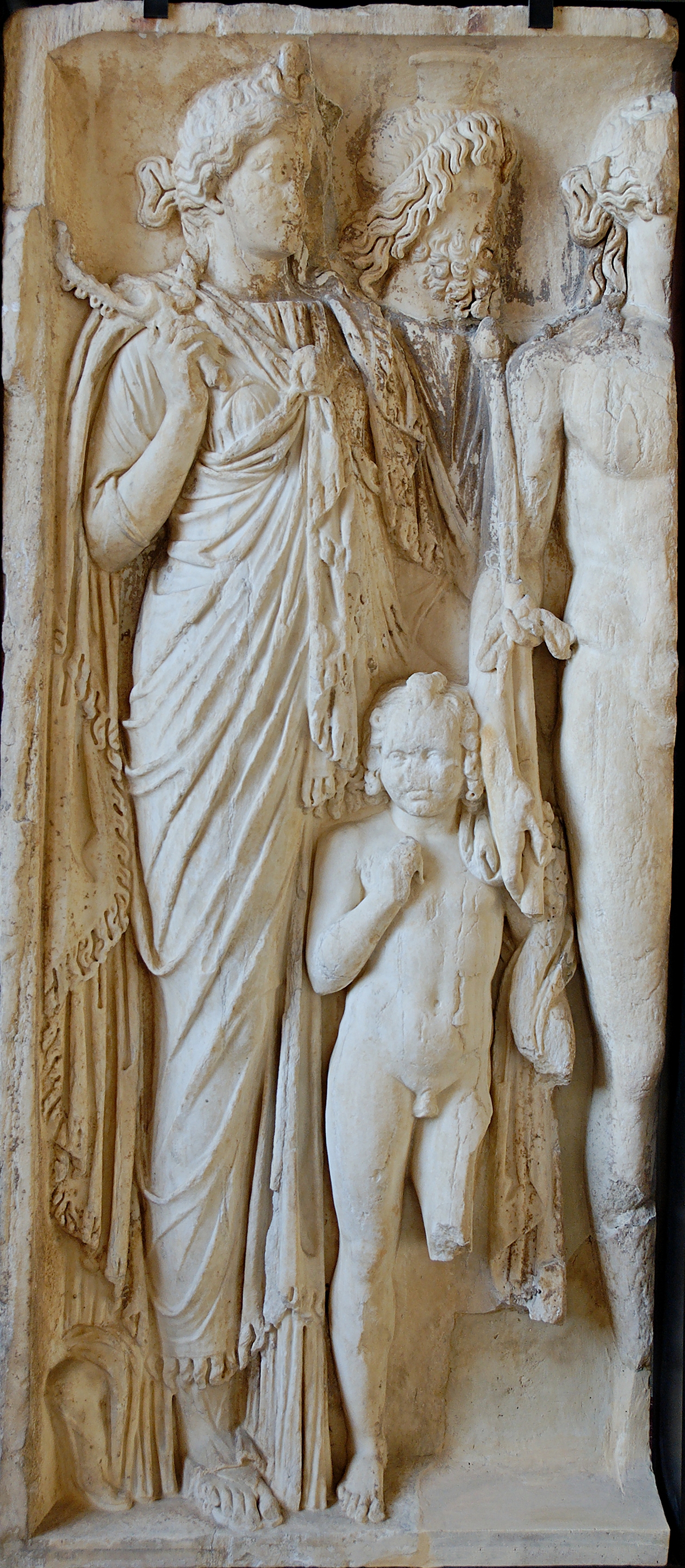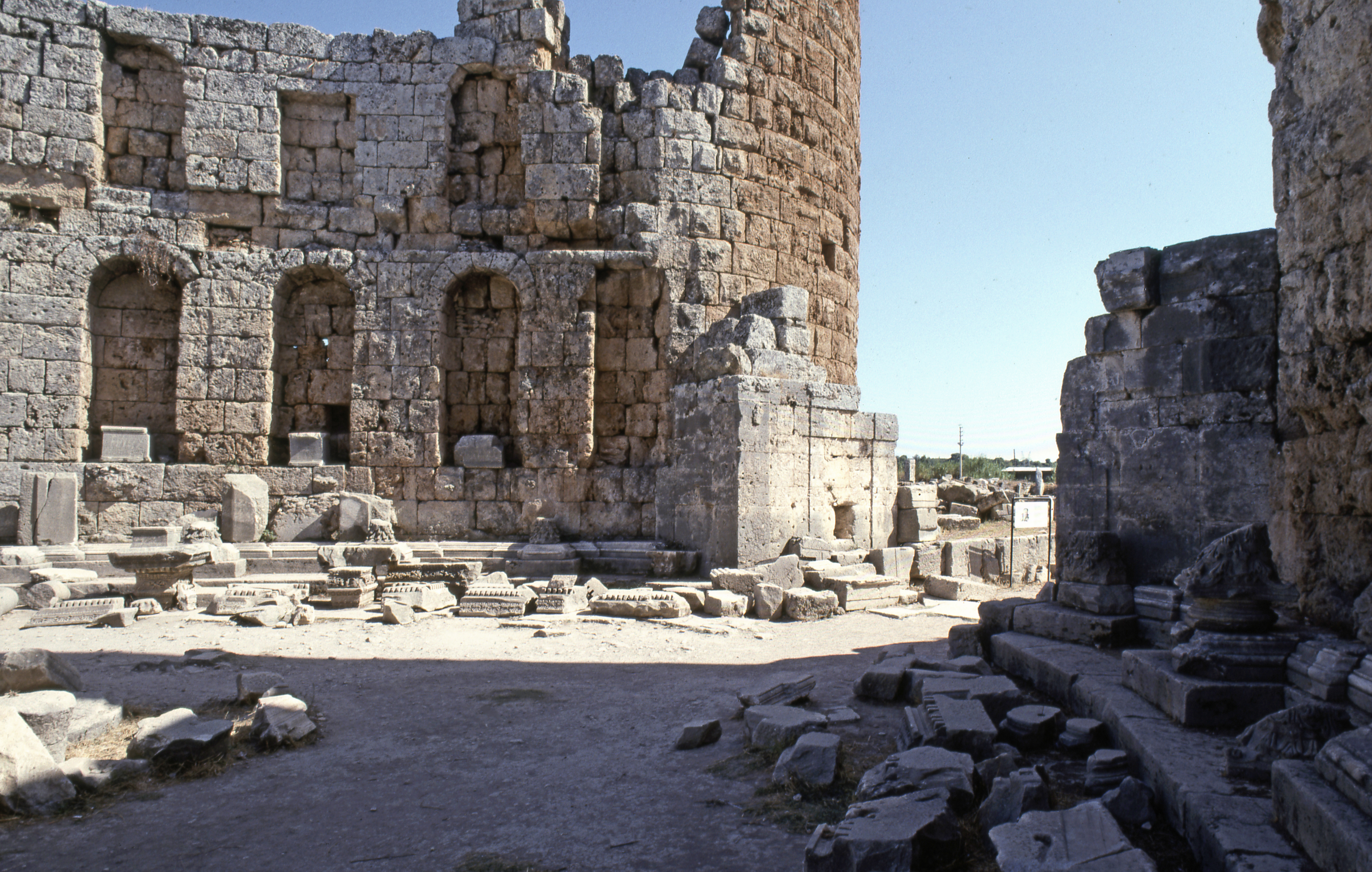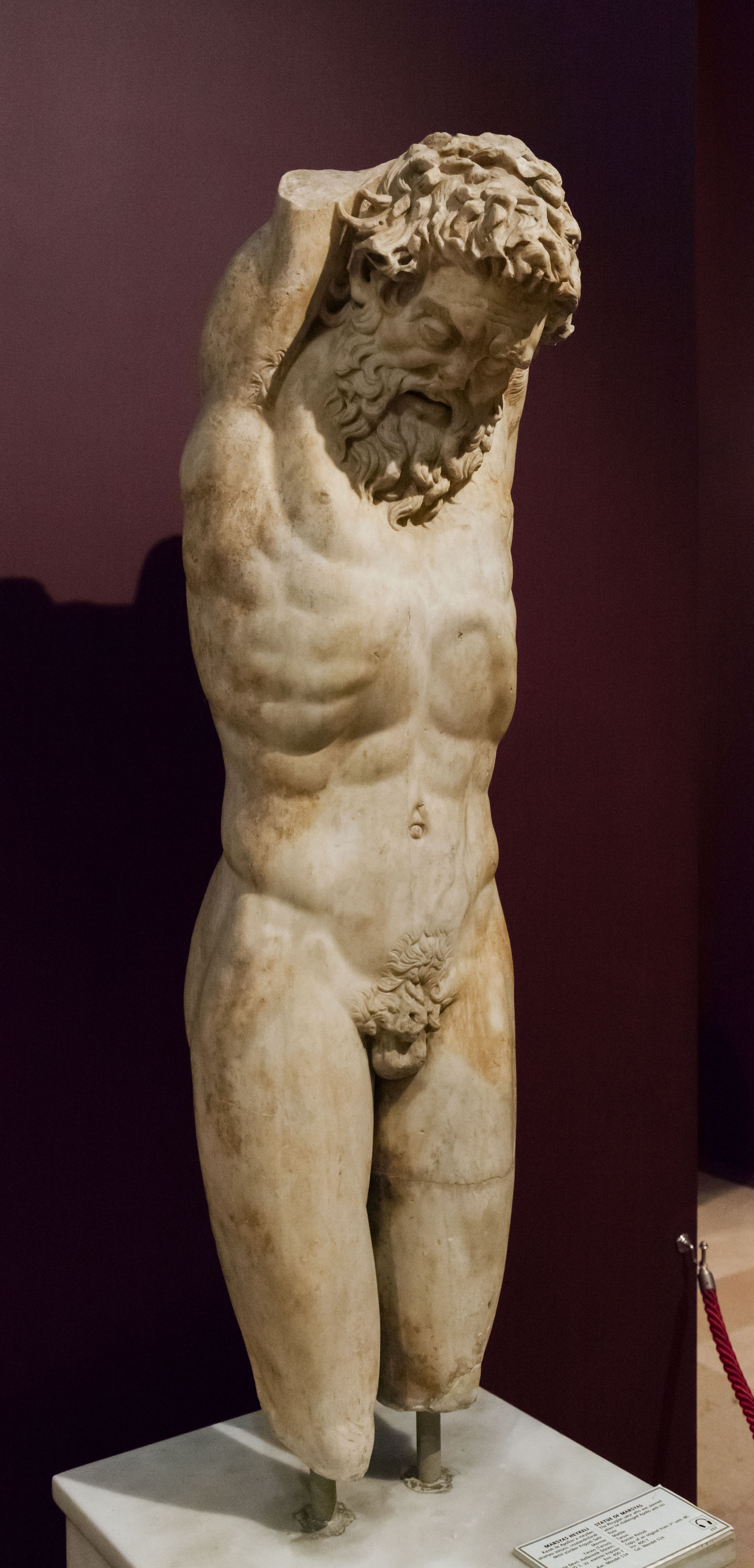|
Antalya Museum
The Antalya Museum or Antalya Archaeological Museum () is one of Turkey's largest museums, located in Muratpaşa, Antalya. It includes 13 exhibition halls and an open-air gallery. It covers an area of and 5000 works of art are exhibited. In addition, a further 25,000–30,000 artefacts which cannot be displayed are in storage. As a museum exhibiting examples of works, which illuminate the history of the Mediterranean and Pamphylia regions in Anatolia, Antalya Museum is one of the most important museums in Turkey. The museum won the "European Council Special Prize" in 1988. History of the museum At the end of the World War I, during the time when Antalya was under Italian military occupation, Italian archaeologists started removing archaeological treasures that had been found in the city centre and surrounding the Italian Embassy, which they claimed to do in the name of civilization. To prevent these initiatives, Süleyman Fikri Bey, the Sultan's advisor, applied to the Antalya p ... [...More Info...] [...Related Items...] OR: [Wikipedia] [Google] [Baidu] |
Muratpaşa
Muratpaşa is a municipality and Districts of Turkey, district of Antalya Province, Turkey. Its area is 96 km2, and its population is 526,293 (2022). The district covers part of the city centre of Antalya, and has a coastline of . The Mediterranean Sea lies to the south of the district. Ümit Uysal is the mayor of Muratpaşa. History Modern day district of Muratpaşa is home to Kaleiçi, the historic center founded by Attalus II Philadelphus, Attalus II, King of Pergamon around 150 BC. Since then, the district has been under Lydians, Lydian, Roman Empire, Roman, Persian Empire, Persian, Byzantine Empire, Byzantine, Seljuk Empire, Seljuk, Kingdom of Cyprus, Cypriot, Beylik of Teke, Teke, Ottoman Empire, Ottoman, and —after the Kingdom of Italy, Italian Partition of the Ottoman Empire#Italy, occupation— Turkey, Turkish rule. Composition There are 55 mahalle, neighbourhoods in Muratpaşa District: [...More Info...] [...Related Items...] OR: [Wikipedia] [Google] [Baidu] |
Harpocrates
Harpocrates (, Phoenician language, Phoenician: 𐤇𐤓𐤐𐤊𐤓𐤈, romanized: ḥrpkrṭ, ''harpokratēs'') is the god of silence, secrets and confidentiality in the Hellenistic religion developed in History of Alexandria#Ptolemaic era, Ptolemaic Alexandria (and also an Hope#In mythology, embodiment of hope, according to Plutarch). ancient Greece, Greeks syncretism , adapted Harpocrates from the ancient Egyptian religion, Egyptian child-god Horus, who represented the newborn sun, rising each day at dawn. The name "Harpocrates" originated as a Hellenization of the Egyptian language, Egyptian ''Har-pa-khered'' or ''Heru-pa-khered'', meaning "Horus the Child". Horus the Child was portrayed as a naked boy with his finger to his mouth as if sucking on it, an Egyptian artistic convention for representing a child. Greeks and Romans misunderstood this pose as a gesture of silence and interpreted Harpocrates as the god of secrecy. Horus In Egyptian mythology, Horus was the c ... [...More Info...] [...Related Items...] OR: [Wikipedia] [Google] [Baidu] |
Caracalla
Marcus Aurelius Antoninus (born Lucius Septimius Bassianus, 4 April 188 – 8 April 217), better known by his nickname Caracalla (; ), was Roman emperor from 198 to 217 AD, first serving as nominal co-emperor under his father and then ruling alone after 211 AD. He was a member of the Severan dynasty, the elder son of Emperor Septimius Severus and Empress Julia Domna. Severus proclaimed Caracalla co-ruler in 198, doing the same with his other son Geta (emperor), Geta in 209. The two brothers briefly shared power after their father's death in 211, but Caracalla soon had Geta murdered by the Praetorian Guard and became sole ruler of the Roman Empire. Julia Domna had a significant share in governance, since Caracalla found administration to be mundane. His reign featured domestic instability and external invasions by the Germanic peoples. Caracalla issued the Antonine Constitution (), also known as the Edict of Caracalla, which granted Roman citizenship to all Peregrinus (Ro ... [...More Info...] [...Related Items...] OR: [Wikipedia] [Google] [Baidu] |
Trajan
Trajan ( ; born Marcus Ulpius Traianus, 18 September 53) was a Roman emperor from AD 98 to 117, remembered as the second of the Five Good Emperors of the Nerva–Antonine dynasty. He was a philanthropic ruler and a successful soldier-emperor who presided over one of the greatest military expansions in Roman history, during which, by the time of his death, the Roman Empire reached its maximum territorial extent. He was given the title of ('the best') by the Roman Senate. Trajan was born in the of Italica in the present-day Andalusian province of province of Seville, Seville in southern Spain, an Italic peoples, Italic settlement in Hispania Baetica; his came from the town of Todi, Tuder in the Regio VI Umbria, Umbria region of central Italy. His namesake father, Marcus Ulpius Traianus (father of Trajan), Marcus Ulpius Traianus, was a general and distinguished senator. Trajan rose to prominence during the reign of Domitian; in AD 89, serving as a in , he supported t ... [...More Info...] [...Related Items...] OR: [Wikipedia] [Google] [Baidu] |
Lucius Verus
Lucius Aurelius Verus (; 15 December 130 – 23 January 169) was Roman emperor from 161 until his death in 169, alongside his adoptive brother Marcus Aurelius. He was a member of the Nerva–Antonine dynasty. Verus' succession together with Marcus Aurelius marked the first time that the Roman Empire was ruled by more than one emperor simultaneously, an increasingly common occurrence in the later history of the Empire. Born on 15 December 130, he was the eldest son of Lucius Aelius Caesar, first adoption in ancient Rome, adopted son and heir to Hadrian. Raised and educated in Rome, he held several political offices prior to taking the throne. After his biological father's death in 138, he was adopted by Antoninus Pius, who was himself adopted by Hadrian. Hadrian died later that year, and Antoninus Pius succeeded to the throne. Antoninus Pius would rule the empire until 161, when he died, and was succeeded by Marcus Aurelius, who later raised his adoptive brother Verus to co-empe ... [...More Info...] [...Related Items...] OR: [Wikipedia] [Google] [Baidu] |
Julia Domna
Julia Domna (; – 217 AD) was Roman empress from 193 to 211 as the wife of Emperor Septimius Severus. She was the first empress of the Severan dynasty. Domna was born in Emesa (present-day Homs) in Roman Syria to an Arab family of priests of the deity Elagabalus. In 187, she married Severus, who at the time was governor of the Roman province of Gallia Lugdunensis. They had two sons, Caracalla and Geta. A civil war over the Roman throne broke out in 193, and shortly afterwards Severus declared himself emperor. The war ended in 197 with the defeat of the last of Severus's opponents. As empress, Domna was famous for her political, social, and philosophical influence. She received titles such as "Mother of the Invincible Camps". After the elder of her sons, Caracalla, started ruling with his father, she was briefly co-empress with Caracalla's wife, Fulvia Plautilla, until the latter fell into disgrace. Following the death of Severus in 211, Domna became the first empress ... [...More Info...] [...Related Items...] OR: [Wikipedia] [Google] [Baidu] |
Hadrian
Hadrian ( ; ; 24 January 76 – 10 July 138) was Roman emperor from 117 to 138. Hadrian was born in Italica, close to modern Seville in Spain, an Italic peoples, Italic settlement in Hispania Baetica; his branch of the Aelia gens, Aelia ''gens'', the ''Aeli Hadriani'', came from the town of Atri, Abruzzo, Hadria in eastern Italy. He was a member of the Nerva–Antonine dynasty. Early in his political career, Hadrian married Vibia Sabina, grandniece of the ruling emperor, Trajan, and his second cousin once removed. The marriage and Hadrian's later succession as emperor were probably promoted by Trajan's wife Pompeia Plotina. Soon after his own succession, Hadrian had four leading senators unlawfully put to death, probably because they seemed to threaten the security of his reign; this earned him the senate's lifelong enmity. He earned further disapproval by abandoning Trajan's expansionist policies and territorial gains in Mesopotamia (Roman province), Mesopotamia, Assyria ( ... [...More Info...] [...Related Items...] OR: [Wikipedia] [Google] [Baidu] |
Plancia Magna
Plancia Magna () was a prominent woman of Perga in the Roman Empire, Roman province of Lycia et Pamphylia who lived in the 1st and 2nd centuries. During her life she was not only a high priestess, but a decurion (administrative), decurion and preeminent benefactress to the city, funding the restoration of the main city gates between the years AD 119 and 122. Ancestry, family, and early life Plancia Magna was the daughter of the Roman Senate, Roman Senator Marcus Plancius Varus and the Herodian Dynasty, Herodian Princess Julia (daughter of Tigranes VI of Armenia), Julia, daughter of king Tigranes VI of Armenia. The Plancia gens, Plancii were among the wealthiest and most notable families of Roman Asia Minor around this time, having arrived in Perga as traders from Latium at the end of the Roman Republic. Both Magna's father and her brother, Gaius Plancius Varus, were given the honorary title ''ktistes'' ("founder"), reflecting their local prominence and patronage of the city. Magna ... [...More Info...] [...Related Items...] OR: [Wikipedia] [Google] [Baidu] |
Marsyas
In Greek mythology, the satyr Marsyas (; ) is a central figure in two stories involving music: in one, he picked up the double oboe (''aulos'') that had been abandoned by Athena and played it; in the other, he challenged Apollo to a contest of music and lost his hide and life. Literary sources from Classical antiquity, antiquity often emphasize the ''hubris'' of Marsyas and the justice of his punishment. One strand of modern comparative mythography regards the domination of Marsyas by Apollo as an example of myth that recapitulates a supposed supplanting by the Twelve Olympians, Olympian pantheon of an earlier Pelasgians, "Pelasgian" religion of chthonic Greek hero cult, heroic ancestors and Animism, nature spirits. Marsyas was a devoté of the ancient Mother Goddess Rhea (mythology), Rhea/Cybele, and the mythographers situate his episodes in Celaenae (or Kelainai), in Phrygia, at the main source of the Meander (the river Büyük Menderes River, Menderes in Turkey). Family Wh ... [...More Info...] [...Related Items...] OR: [Wikipedia] [Google] [Baidu] |
Hermes
Hermes (; ) is an Olympian deity in ancient Greek religion and mythology considered the herald of the gods. He is also widely considered the protector of human heralds, travelers, thieves, merchants, and orators. He is able to move quickly and freely between the worlds of the mortal and the divine aided by his winged sandals. Hermes plays the role of the psychopomp or "soul guide"—a conductor of souls into the afterlife. In myth, Hermes functions as the emissary and messenger of the gods, and is often presented as the son of Zeus and Maia, the Pleiad. He is regarded as "the divine trickster", about which the '' Homeric Hymn to Hermes'' offers the most well-known account. Hermes's attributes and symbols include the herma, the rooster, the tortoise, satchel or pouch, talaria (winged sandals), and winged helmet or simple petasos, as well as the palm tree, goat, the number four, several kinds of fish, and incense. However, his main symbol is the ''caduceus'', a wi ... [...More Info...] [...Related Items...] OR: [Wikipedia] [Google] [Baidu] |
Hecate
Hecate ( ; ) is a goddess in ancient Greek religion and mythology, most often shown holding a pair of torches, a key, or snakes, or accompanied by dogs, and in later periods depicted as three-formed or triple-bodied. She is variously associated with crossroads, night, light, magic, witchcraft, drugs, and the Moon.Seyffert, s.vHecate/ref>d'Este, Sorita & Rankine, David, Hekate Liminal Rites, Avalonia, 2009. Her earliest appearance in literature was in Hesiod's '' Theogony'' in the 8th century BCE as a goddess of great honour with domains in sky, earth, and sea. She had popular followings amongst the witches of Thessaly, and an important sanctuary among the Carians of Asia Minor in Lagina.Burkert, p. 171. The earliest evidence for Hecate's cult comes from Selinunte, in Sicily. Hecate was one of several deities worshipped in ancient Athens as a protector of the '' oikos'' (household), alongside Zeus, Hestia, Hermes, and Apollo. In the post-Christian writings of the Chalde ... [...More Info...] [...Related Items...] OR: [Wikipedia] [Google] [Baidu] |
Meleager
In Greek mythology, Meleager (, ) was a hero venerated in his '' temenos'' at Calydon in Aetolia. He was already famed as the host of the Calydonian boar hunt in the epic tradition that was reworked by Homer. Meleager is also mentioned as one of the Argonauts. Biography Meleager was a Calydonian prince as the son of Althaea and the vintner King Oeneus or according to some, of the god Ares. He was the brother of Deianeira, Toxeus, Clymenus, Periphas, Agelaus (or Ageleus), Thyreus (or Phereus or Pheres), Gorge, Eurymede and Melanippe. Antoninus Liberalis2as cited in Nicander's ''Metamorphoses'' Meleager was the father of Parthenopeus by Atalanta but he married Cleopatra, daughter of Idas and Marpessa. They had a daughter, Polydora, who became the bride of Protesilaus, who left her bed on their wedding-night to join the expedition to Troy. Mythology Calydonian boar hunt When Meleager was born, the Moirai (the Fates) predicted he would only live u ... [...More Info...] [...Related Items...] OR: [Wikipedia] [Google] [Baidu] |










